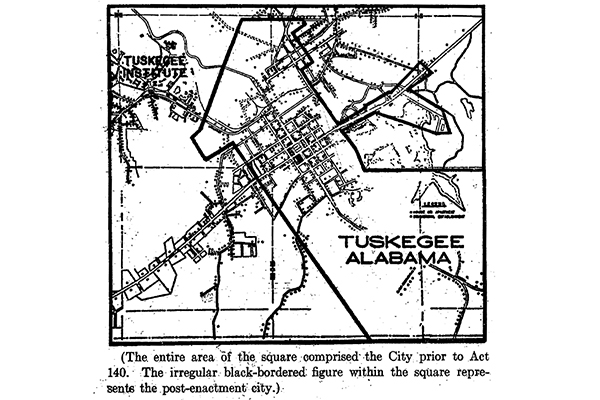| |
|
 |
 |
Tuskegee, Alabama
Disincorporation as political weapon
|
What does it mean to disincorporate? To loosen the bonds of municipal incorporation? To effect the dissolution and erasure of a municipal entity–its boundaries, its administrative structure, and its social and economic imperatives? Disincorporation is the non-spectacular, administrative cousin to the more material urban destruction and reconstruction that has come to occupy the disciplinary imagination whenever questions of shrinkage, decay, and population loss are invoked. Disincorporation, of course, brings us into the field of urban eschatology, with all the concerns of judgment and final destiny this may imply. That the call for the dissolution of a city–what some call a form of urbicide–strikes mightily at the heart of an urban discourse makes sense; we essentially do not have a language for thinking otherwise–for thinking outside of a capitalist logic of continuous growth.
If incorporation is a prelude to the urban, then we might understand disincorporation as a prelude to territory. It is a becoming-landscape of an administrative ordering of lower energetics. A deterritorialization of the city, where excess, expenditure, and senescence are constituent processes in a more general theory of urbanization. At stake in disincorporation is the diagram linking territory, sovereignty, and governance in their numerous imbrications–where cities and citizens are no longer found to be addressable.
As a body of legal theory, disincorporation is the less elaborated twin of municipal incorporation law. As a category of urban theory, disincorporation is rarely if ever even invoked; a range of other rhetorical and descriptive language is often inserted instead. What the language of disincorporation provides that, say, the language of shrinking cities does not, is a merging of concrete administrative procedures with a theoretical framework for thinking differently about the political stakes of a growth model of urbanism. For the leading legal scholar on municipal disincorporation, Michelle Wilde Anderson, "Dissolution opens a new chapter in understanding shrinking cities, a chapter we can think of as shrinking governance." So where the shrinking cities discourse tends to merge radically different political, economic, and social contexts under a single, formal category of description, the discourse around disincorporation refers to a very specific administrative operation and its socio-spatial effects.
To understand disincorporation, we must also understand its necessary prelude–municipal incorporation. Municipal incorporation is the explicit provisioning of powers, privileges, and immunities–the power to designate inclusions and exclusions, and the capacity to dictate how land is zoned, used, and ultimately valued. Additionally, incorporation explicitly provides for the mobilization of a police force, drafting of regulations, establishment of permanent administrative bureaucracies, procedures for taxation, and the development of unique codified law–the primary building blocks of a much broader capitalist state. In short, incorporation marshalls the city as agent, as instrument, and, perhaps, as weapon.
|
|
